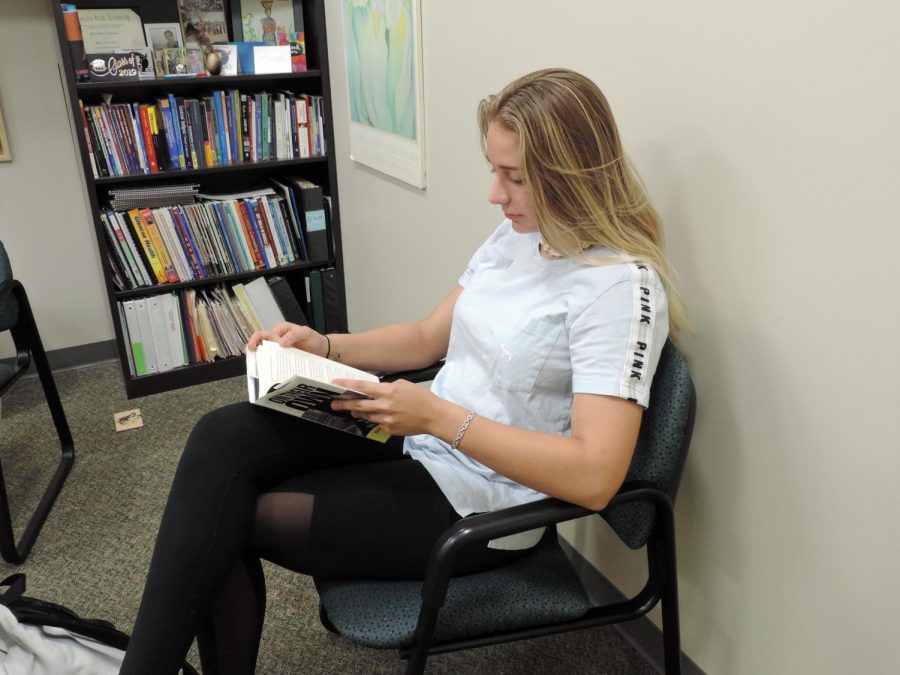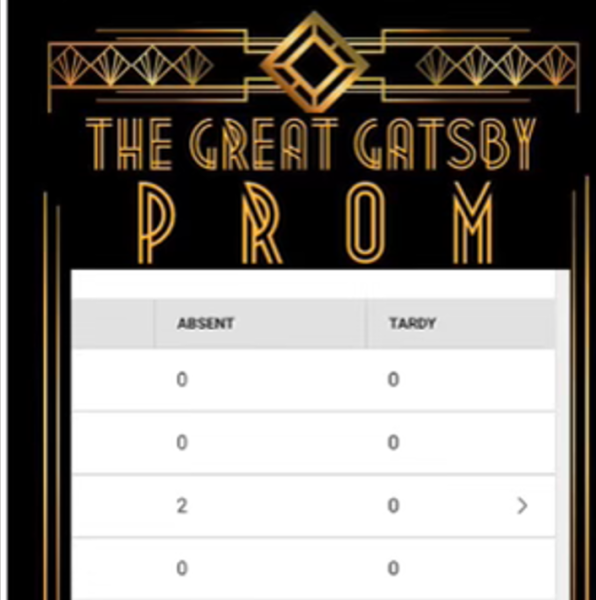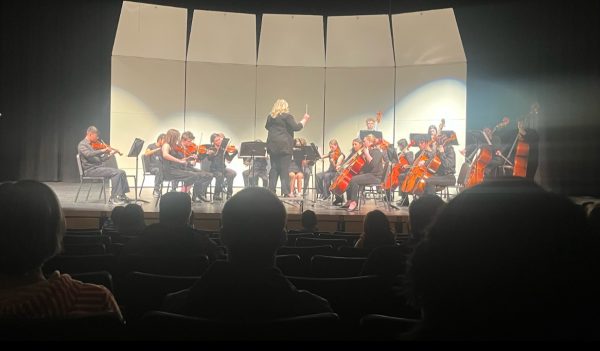Independent reading becomes a priority in English classes
Students and teachers share their thoughts on independent reading
Do you remember in elementary school when your whole class went on over to the school library to pick out books? Do you remember the reading quizzes for Accelerated Reading (described by Gretzky Gilman (’20) as “the devil”) that everyone dreaded? Do you remember the last time you finished a book?
Most people aren’t huge bookworms and don’t invest much time in reading for fun. Chances are you’re one of these people and haven’t read in forever unless teachers forced you to. Which is what all non-AP English teachers are doing this year.
But teachers aren’t just making students read the run-of-the-mill Shakespeare, Animal Farm, The Great Gatsby, etc. They’re letting students read whatever book they want for fifteen minutes at the beginning of every class. No reading level stuff, no minimum length, no quizzes, no reading logs, no book reports; just reading for the sake of reading.
Teachers are emphasizing independent reading “because there [are] tons and tons of research on the benefits of independent reading for students as far as improved comprehension, their vocab, their writing skills, their basic background knowledge in everything in the world, building empathy, every aspect of humanity, basically, is supported by independent reading,” according to Ms. Cassie Sonnenberg, who teaches English 11 and Integrated for freshman.
Teachers also hope that students will make independent reading a habit in their current and future day-to-day lives. When people have to do the chores teachers call “book reports”, reading becomes an annoying hassle, and any enjoyment from the book itself is leached away by assignments. This often causes students to see reading as a way to get a good grade and not as an important practice to be cultivated in its own right.
Agency is another important component of the new program. “…There’s tons of research out there… about the value of choice and letting students choose things that they are interested in… they should have access to books that are like a mirror, like about students or people who look like them, act like them, think like them, and then books that are windows helping them understand other people’s perspectives better. So when they can choose, they can pick one way or the other, and then when I assign reading, hopefully, we get the other aspect,” said Sonnenberg.
There is one teacher here at Mead High, Mrs. Shannon Martenson who can’t do independent reading because she teaches AP English Language and Composition. “With AP, they are already reading so very much [that] if I add that, they would have a meltdown. In the past, they can choose their own books. If it’s not covered in class, they’re still getting it outside of class.”
She thinks that if she assigns her students the right books to read, even if they don’t like the content, it can get them ready for the AP exam in May. When I asked her if her students like the books she has them read she said, “Are they gonna give me something from the eighteenth century or from two weeks ago. Throw a bunch of stuff they need so they have the tools to decipher it no matter what.” She states, “ Independent reading is a luxury.”
However, reading is a luxury that prosperous people need. Or at least that’s what the research says. Ms. Sherri Platt, a librarian at Mead Middle School that did a book study with teachers on The Book Whisperer by Donalyn Miller, directed us to a paper by School Library Media Research that very thoroughly explains the facts of how beneficial reading is for literally all ages. “The amount of free reading done outside of school has consistently been found to relate to growth in vocabulary, reading comprehension, verbal fluency, and general information… [It is] imperative to give adequate time for independent, self-chosen reading [and] to demonstrate the value and pleasure of reading and writing…”
Considering how humans tend to hate things that are good for them (i.e. spinach, broccoli, flu shots, etc.), the student reaction to forced independent reading has been fantastic. Every student we interviewed, even those who said, “I’ve never been a reader,” was happy with the independent reading.
Students also believe that reading is important to their academics. “If this summer till now, if I wasn’t reading, I probably would fall behind,” said Benjamin Delfosse (’23).
Indeed, reading is essential, and everyone should devote time to books every week or day.
To learn more about independent reading, click here.
Your donation will support the student journalists of Mead High School. Your contribution will allow us to purchase equipment and cover our annual website hosting costs.

Adah McMillan is a Senior. She enjoys reading, drawing, eating candy, playing the piano, listening to musicals, and being right. She is involved in choir, NHS, the MHS Book Club, and SVVSD's Innovation Center. She is excited to do more work in The Mav this year and make the website as perfect as it can be.
You can contact her at [email protected].

Allison Muncy is a senior. She enjoys writing poetry, watching marvel movies and hanging out with Jarom. She is looking forward to producing poems each week and to have a place people can go to for help.
You can contact her at [email protected]












Rachel Long • Sep 27, 2019 at 2:04 pm
I love that students are getting the chance to read for pleasure in school. Reading is one of my favorite pastimes. I read every day for pleasure. I’m always up for a book discussion with students. Good reporting!
Fred Wilson • Sep 25, 2019 at 3:08 pm
I am excited that students are free reading and developing that habit. The story makes the connection to prosperous people and the habit of reading which reminded me of a series on Bill Gates that is on Netflix. In that interview he attributes 100% of his success to the habit of reading for 2 hours every day (if he has the time I’ll bet most of us could make it happen…).
Great reporting Adah and Allison.
Steve Parsons • Sep 25, 2019 at 2:31 pm
I’m so happy the English department is doing this and that you two wrote about it! Well written, informative reporting. I hope this encourages people to become life long readers!